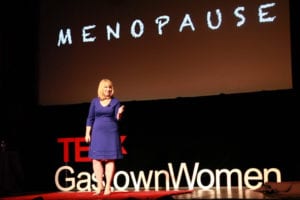Let’s look at the history (and stigma) of menopause. Have you noticed how often the word is swept under the carpet?
It’s a pretty ugly word – the Chinese term ‘Second Spring’ is so much nicer!
Whatever you think of it, ‘menopause’ is a word that’s often misused, as it’s used so broadly. In actuality, it’s more accurate to speak of:
- Perimenopause – the lead up to menopause when we experience most of the signs.
- Post-menopause – fertility and menstruation finish and we need to focus on different aspects of health.
- Menopause – we only know we’ve experienced it in hindsight because by definition menopause occurs 12-months after our last period.
Even though it’s often touted as one of the last taboos we’re lucky to be experiencing it during the 21st Century.
The History of Menopause
We thought it would be interesting to take a walk through time to discover how much has changed. Many of us like to think we live in an enlightened society – but guess what? It’s not that illuminated when it comes to menopause.
While there is more talk and openness on the subject it’s still relatively quiet. Even PubMed, a medical research tool, has noted there wasn’t a lot of research in the early days.
What Does The Word Menopause Mean?
A French physician, Dr. Charles Negrier, coined the term menopause way back in 1821.
It means the ceasing of menstruation and is taken from the Greek words pausis (pause) and mēn (month).
Menopause as ‘The Change Of Life’
Menopause is also commonly called ‘the change of life’. I’ve felt my life-changing so it’s an accurate description in my opinion. The ancient wisdom of Traditional Chinese Medicine (TCM) and Ayurveda have a beautiful way of looking at ‘the change’. For example, I’ve already referred to ‘second spring’ – TCM’s term for menopause. They also recognise menstruation as heavenly waters and fertility as ripening the fruit. Beautiful! Ayurveda looks at a woman’s different life stages as the maiden, the mother and the crone (wise one).
The Connection Between Menopause & Hysteria
Historically menopause has been less understood by the West (and still is in many ways). In the early days, Western medics often diagnosed menopausal women with ‘hysteria’ and sent them away to sanitariums.
It can be a tough time mentally for some women. Anyone who hasn’t had a smooth menopausal transition will vouch for that. However, I’m sure sending women to sanitariums with hysteria didn’t help!
NB: The word hysteria originates from the Greek word for uterus, hystera (ὑστέρα). The Greeks believed the uterus moves through a woman’s body, eventually strangling her and inducing disease. Hysteria was believed to manifest in women with a variety of symptoms including anxiety, shortness of breath, fainting, insomnia, irritability, nervousness, as well as sexually forward behaviour. Source – Wikipedia
Can you see why I said we’re lucky to be living now?
Menopause in the 1930s, 1940s, 1960s, 1970s
Medical research amped up in the 19th Century so thankfully, they stopped locking us up!
In the 1930s menopause was believed to be a disease of deficiency. By the ‘70s the medical fraternity was prescribing estrogen replacement therapy (HRT) touting it as our ‘freedom’.
Synthetic estrogen was developed in 1938, and Premarin (which famously comes from pregnant horse urine) in 1942. Premarin is used in HRT, though I’m not sure if it still comes from pregnant horse urine! You’ll need to check that one with your doctor.
In the 1960s, a gynaecologist and his wife, Robert and Thelma Wilson, published a scientific article arguing that menopause robbed women of their femininity, ruined the quality of their lives, and recommended estrogen therapy. Dr Wilson then wrote a book, Feminine Forever, in which he called menopause an estrogen deficiency disease. The book became a best seller with feminists.
The International Menopause Society was founded in the 1970s and the first International Congress on Menopause was organised in Paris in 1976.
All in all, the information available around menopause throughout the decades is sketchy.
The Differences in Menopause For Women Geographically
PubMed tells us the signs of meno differ geographically. For example, in the West, we’re very familiar with the term ‘hot flush’.
A painful shoulder is common in Japan and eyesight issues in India. The onset of perimenopause occurs earlier on average in India than it does for Westerners and they don’t view it nearly as negatively as we do. This is a key point.
Negativity Surrounding Menopause
In our world, there’s quite a lot of negativity around the subject of menopause. There is also a massive lack of knowledge and information. Even GPs get very little training in menopause which doesn’t help a woman’s cause.
I wonder if the negativity stems from ageism as we live in a society that worships youth over wisdom. Certainly, some of it might still stem from the fall-out of the hysteria/mental illness diagnoses of the past. Sometimes there can be a lingering vestige of fear around an area that endures for decades.
"There are too many taboos surrounding women’s bodies and I think it equals a big lack of respect. You might be thinking, ‘What’s the relationship between hormones and respect?’ It’s completely related. Words like 'period', 'post-partum depression', 'menopause'. Even today, those words, you bring them up at a dinner table, everybody gets nervous. Even if it's a group of women, if men are also at the table, the energy gets very nervous. The perimenopause goes from 40 to 50, and nobody talks about that. Society keeps things as a taboo and I'm really angry about this."
Penelope Cruz, Tatler Magazine, August 2019 Tweet
The Truth? Menopause Normal
Perimenopause, menopause, post-menopause, change of life, midlife transition – whatever we want to call it – is a normal part of a woman’s life.
This means 50 percent of the global population will experience it. Baby boomers are menopausal now. Even the oldest millennials have reached perimenopause.
There’s an awareness movement going on around the globe. Women’s voices are becoming louder as they champion recognition and arm themselves with education and research.
With that said, there’s still a long way to go. But the good news is inroads are being made, the conversations are opening up and women are insisting on being heard and providing learnings for each other.
Because – especially when it comes to menopause – knowledge is power.
That’s what we believe. It’s why we created this ‘library’.
What do you think? We’d love to hear your comments below.
What to know if you’re in Peri or Post Menopause? Take our quiz below to find out!
Share with a friend
Sign up for for weekly wisdom drops & news 🙂








